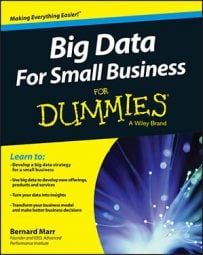When companies start dipping into big data, a common mistake is to head straight for the data itself. The sheer array of data available, not to mention the possibilities for collecting new data in the future, is incredibly exciting. But when your first thought is, ‘Hmmm, what data can I get my hands on?’ (accompanied by evil-genius-style hand rubbing), you’re already missing the enormous potential of big data.
Data is a powerful tool that helps you answer strategic business questions, make smarter decisions, improve the way you do business and, ultimately, achieve your long-term business goals. But, for it to do that, you need to start with strategy – not the data itself.
Instead of focusing on what data you already have or what data is available out in the big wide world, start by working out exactly what it is you want to achieve in your business. Are you looking to decrease staff turnover? Improve product development? Understand more about your customers? Each of these objectives requires a different approach and, you guessed it, different types of data. When you know exactly what it is you’re trying to achieve, only then can you turn your attention to the data (or combination of data) that can help you do that.
Treat big data like any other big business investment, such as expanding into a new retail location or upgrading your manufacturing equipment. You wouldn’t jump into either of those things without a lot of careful thought about what you want to do and why. For instance, you’d probably set out the pros and cons, weigh up the costs and benefits and make a clear business case for the investment.
It’s exactly the same with data: You should be able to make a strong business argument for using big data in your business. To do that, you need to know where your business is heading and how data can help you get there.

